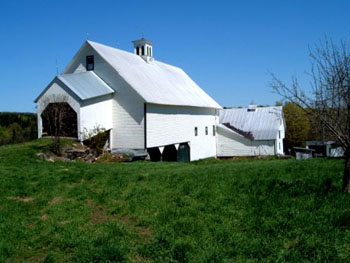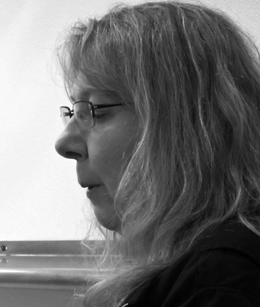Templeton Farm
Contact Us
Templeton Farm
3410 Center Road
East Montpelier, Vt. 05651
802-223-0169
802-461-5352
[email protected]
Templeton Farm
3410 Center Road
East Montpelier, Vt. 05651
802-223-0169
802-461-5352
[email protected]

Chalk up another "first" for Vermont.
The state was the first to outlaw slavery, the first to legalize civil unions, and the first to pass a single-payer health care law, among other singular achievements. It may not be as significant, but the fact that Vermont recently became the first state to require local slaughterhouses to file a written humane handling plan falls in line with the state's tradition of leading the way on moral issues.
And it happened because of what is widely considered to be one of the most immoral events to occur in Vermont agriculture in recent memory.
On October 30, 2009, the U.S. Department of Agriculture (USDA) and the Vermont Agency of Agriculture shut down Bushway Packing, a slaughterhouse in Grand Isle, having been shown a disturbing undercover video in which young dairy calves as young as a few days old were being kicked, dragged, repeatedly shocked, and in one case skinned alive by Bushway employees. A few days later, the video�shot by an undercover employee of the Humane Society of the United States (HSUS)�went viral, reaching thousands of Humane Society members across the country and giving Vermont's meat industry a temporary bad name.
It was widely noted in Vermont that this was an aberration. As Katherine McNamara, an assistant state veterinarian at the Agency of Agriculture, says today, "The only time you hear about these guys is when there's bad news, but the majority of them do a great job." Still, the Vermont legislature felt compelled to act and responded to Bushway by passing a wide-ranging bill pertaining to humane handling at local slaughterhouses.
As a result, today a student of Temple Grandin, the renowned animal scientist, is advising Vermont slaughter facilities on how to improve conditions for animals. All 12 of Vermont's commercially licensed livestock and poultry slaughterhouses have filed written humane handling plans that current and future employees�as well as the public�can review. And a new advisory board made up of representatives of the farming and animal welfare communities now meets quarterly to discuss farm animal legislation and to issue opinions to legislators.
"You've got the highest [humane] criteria in the country for your state plants," says Andrew Gunther, executive director of Animal Welfare Approved, a farm certification program based in Virginia. "You guys are all over it."
....
Bushway Packing had been open for only four months when Dean Wyatt, the USDA's public health veterinarian in charge of inspectors at a handful of Vermont slaughterhouses, issued his first humane handling violation to the plant in May 2009. Two more violations were issued in June and July. In all three cases, Bushway�which primarily slaughtered male calves from dairy farms�was temporarily closed. But each time, the owners immediately filed corrective action plans, leading the USDA to re-open the plant by the following day.
Because Bushway was staffed by federal inspectors (although some state inspectors also worked there), the USDA was the first point of contact about the violations. Kristin Haas, the Vermont state veterinarian, said in a recent interview that the Vermont Agency of Agriculture was aware of the violations but had confidence that the USDA was following the proper protocols to address them.
"What we did about it was to trust that the reports we were getting on the remediation were working," she said. "It wasn't until the video came out that there was any evidence or reason to believe that there were ongoing, persistent issues going on there."
Despite differences of opinion between the state and the HSUS over how much the Agency knew prior to the release of the video, the farming and animal welfare communities both asked, in the wake of Bushway, how the Agency could improve its oversight of local slaughterhouses. When the Vermont legislature convened in Spring 2010, the House and Senate agricultural committees had the task of finding an appropriate legislative response to Bushway that strengthened state oversight of Vermont's slaughterhouses while not burdening an already fragile industry.
Some legislators initially called for installing video cameras in slaughterhouses. But as the bill went back and forth between the House and Senate, it was softened at the urging of farmer-legislators. The bill that ultimately passed:
"What Bushway did was point out to the state that it cannot abdicate responsibility to the feds, that it has to take its own responsibility for slaughter plants in this state," says Mary Beth Sweetland, the HSUS senior director of research and investigations, who lives in the Bennington area. (Vermont slaughterhouses are governed by both state and federal laws and staffed by both state and federal employees.) The bill doesn't guarantee that the system will always catch incidents of abuse on the level of Bushway�the undercover video showed the mistreatment taking place in front of a federal inspector, who was later fired�but according to Haas, the written plans and the training "will hopefully create more buy-in among slaughterhouse employees about humane handling, so that an incident like that doesn't happen again."
The bill also created a Livestock Care Standards Advisory Council, meant to get members of the farming, veterinarian, and animal welfare communities together to discuss farm animal policy issues and deliver opinions to the Agency of Agriculture and the legislature. Joanne Bourbeau, Vermont state director for the HSUS, says she is pleased that there are three animal welfare slots on the 12-member council, given that other states have councils that the HSUS feels have little animal welfare representation. (Go to localbanquet.com for the names of current Council members.)
"Sometimes it takes events like Bushway to shake everybody up and get the ball rolling on reform," Sweetland says. "To Vermont's credit, it did that."
....

Erika Voogd is a plain-spoken woman from Chicago with an easy laugh who is getting to know Vermont quite well these days. She's an international consultant who advises slaughter plants and food companies on humane handling and food safety compliance, and she has trained with Temple Grandin, the author and animal scientist who uses her personal experience of autism to understand animals and to improve slaughter conditions for them.
"She is a brilliant, remarkable person," Voogd says of Grandin. "For some reason I was drawn to this kind of work because of her. She has such a passion for it and a focus on helping people make change."
With some of the money released by the 2010 bill, the Vermont Agency of Agriculture hired Voogd (pronounced "vogue") to help local slaughterhouse owners document and improve their plant's humane handling practices. Any slaughterhouse owner can ask Voogd for assistance, free of charge; seven plants have already contacted her. She is also the person who reviews the written humane handling plans that all Vermont slaughter plants must now submit. (All 12 plans have been approved.) Slaughterhouses always have had follow to federal humane laws�and inspectors are there to enforce them�but Vermont legislators wanted written plans so that new employees could have the federal humane laws interpreted clearly for the place which they work.
Given that employee training is one of Voogd's top three requirements for a humane operation (the other two are facility design and maintenance), it's fitting that she is also developing a "train the trainer" manual for Vermont plants (which other states could eventually use, too) so that slaughterhouse management, not just Voogd, can train their employees in humane handling.
Voogd has worked for such giants as Oscar Meyer and OSI Industries (which makes hamburgers for McDonald's), but on a sweltering June day this year she was at a much smaller place�the Royal Butcher on the Randolph-Braintree line. She was reviewing steps that slaughterhouse owner Royal Larocque has taken over the past year to improve humane handling at his plant, including rebuilding the outside corridor that animals walk through to enter the plant. (The old corridor used to let in daylight, which created shadows that upset the animals as they entered; the new corridor hardly lets in any light.)
Speaking in the small corner office of his slaughterhouse, Larocque�more affable and cheerful than his profession would suggest�seemed appreciative of having to create a written humane handling plan. "It's making me understand it all better," he said. "We were doing a lot of things already but we weren't documenting it." In fact, Voogd cites the Royal Butcher as a model when she visits other plants around the country.
These days, Vermont slaughterhouses are getting more attention than they ever have�not negative attention, as with Bushway, but attention from local food organizations and funders who recognize the importance of slaughter facilities to the local food system (no slaughterhouses, no local meat). The Vermont Farm Viability Program has awarded a number of grants to local slaughterhouses for increased processing capacity. The Agency of Agriculture is offering matching grants for capital improvements and is developing a curriculum and training program for skilled meat cutters. And several organizations are in the process of jointly creating a new "meat processing committee" to look at slaughterhouse infrastructure and financial needs.
Humane handling can be an outgrowth of a financially viable operation and can, in turn, contribute to a plant's success. Larocque said that keeping animals calm and safe isn't just right for the animals; it keeps his employees calm and safe, too, and lowers the risk that the meat will come out bruised and have to be trimmed, which doesn't please farmers.
He mentioned that he has become certified under the strict criteria of the Animal Welfare Approved program. He said he shows his employees videos about humane handling and tests them afterward. He opened a creaky old file cabinet to show, with some pride, how much paperwork related to humane handling he has saved.
"I'm just trying to do this right," he said.